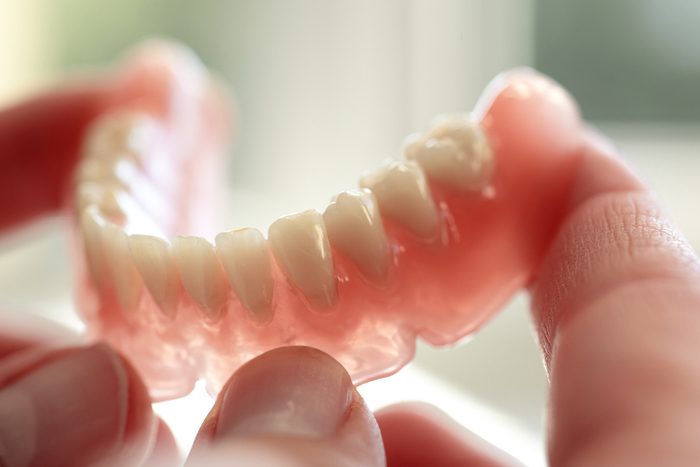Dentures and partials are two of the most popular methods to replace missing teeth. They can replace anywhere from one tooth to an entire arch of teeth. At Smile Land Family Dental, we provide dentures and partials as part of our restorative dentistry services.
Getting Dentures in San Antonio, TX
If you are missing teeth, dentures and partial dentures are a great way to restore your smile and make eating and speaking easier. Dentures are removable dental appliances that replace missing teeth. There are two main types: full dentures, which replace all the teeth in the upper or lower jaw, and partial dentures, which fill in the gaps left by missing teeth when some natural teeth remain.

Initial Consultation
The first step in getting dentures or partials is to visit your dentist. During this initial consultation, your dentist will examine your mouth to determine your needs, check your health and strength if you have remaining teeth, and discuss your options, including the benefits of full or partial dentures.
Your dentist may take X-rays or impressions of your mouth to get a clear idea of the shape of your gums and remaining teeth. Based on this examination, the dentist will decide whether dentures or partials are right for you.
Preparing Your Mouth
If you have any remaining damaged or decayed teeth, the dentist may need to remove them before making your dentures. For people who need full dentures, the gums may need time to heal after tooth extractions. This healing process can take several months, during which the dentist will monitor your progress.
If you are getting partial dentures, your dentist may need to reshape some of your natural teeth so the partial can fit properly. Sometimes, you may need to wear temporary dentures during this healing period.
Taking Impressions
Once your mouth is ready for dentures or partials, your dentist will take impressions (molds) of your gums and teeth. These impressions are essential for creating custom dentures that fit comfortably in your mouth. The impressions are sent to a dental lab, where the dentures or partials will be made to match the shape and size of your mouth. During this process, your dentist may also take measurements to ensure that your dentures fit properly and align with your bite.
Fitting and Adjustments
After the dentures or partials are made, you’ll return to your dentist for a fitting. The dentist will place the dentures in your mouth and check how they fit. This is an important step because dentures should fit snugly but not cause pain or discomfort. The dentist will make any necessary adjustments to improve the fit. You may need to visit the dentist several times to get the perfect fit. It’s normal for the dentures or partials to feel slightly uncomfortable at first as your mouth adjusts to them.
Final Adjustments
Once your dentures or partials fit properly and feel comfortable, the dentist will make any final adjustments. They will check to ensure that your bite is correct, and you should be able to chew, speak, and smile easily. The dentist will also give instructions on caring for dentures and partials to keep them clean and in good condition. If you are getting partials, the dentist may provide special tools to help you clean your partials and remaining natural teeth.
Implant-Supported Dentures
Getting implant-supported dentures is a step-by-step process that involves several important steps. First, your dentist will evaluate your oral health to determine if you’re a good candidate for the procedure. If you have enough healthy bone in your jaw, you may be able to move forward with getting dental implants. If necessary, your dentist might recommend bone grafting to build up the bone before proceeding.
Once your mouth is ready, the next step is placing the dental implants into your jawbone. This procedure is done under local anesthesia, so you won’t feel any pain. The implants are small titanium posts that will fuse with your jawbone over several months in osseointegration.
Once the implants are securely in place, your dentist will create custom dentures that fit perfectly on the implants. Depending on the design, these dentures are then attached to the implants, either by a fixed attachment or a removable system.
Benefits of Implant Dentures
Implant dentures come with many benefits compared to traditional dentures.
Better Stability and Comfort
One of implant dentures’ biggest advantages is their increased stability. Traditional dentures rest on your gums and are held in place with adhesives or suction. This can sometimes cause discomfort or slipping, especially when eating or speaking. Implant dentures, on the other hand, are securely attached to the implants in your jawbone. This makes them far more stable and comfortable, allowing you to eat, talk, and laugh confidently.
No Need for Adhesives
With traditional dentures, many people rely on adhesives to keep the dentures in place. This can be messy, inconvenient, and ineffective at times. With implant-supported dentures, you no longer need to use adhesives because the dentures are securely attached to the implants. This makes daily life much easier and more comfortable without the worry of dentures slipping out of place.
Improved Chewing Function
Because implant dentures are anchored in the jawbone, they allow for better chewing and biting. Traditional dentures can sometimes make it difficult to chew certain foods, especially hard or sticky ones. Since implant-supported dentures are more stable, they allow you to eat a wider variety of foods without discomfort. You’ll be able to enjoy meals more freely and comfortably.
Better Jawbone Health
Another important benefit of implant dentures is that they help protect your jawbone. When you lose teeth, the bone in your jaw can shrink and weaken over time because it no longer has the stimulation it needs from the tooth roots. Implant-supported dentures help prevent this bone loss by stimulating the jawbone, just like natural tooth roots would. This helps keep your jawbone strong and healthy.
More Natural Look and Feel
Implant dentures also offer a more natural look and feel than traditional dentures. Since they are securely anchored in your jawbone, they don’t shift around like regular dentures can. This gives you a more natural appearance and prevents the awkwardness of dentures moving when you talk or eat. Additionally, because the implants integrate with your bone, implant-supported dentures feel more like natural teeth.
Long-Lasting Solution
Implant dentures are a long-term solution for missing teeth. With proper care, they can last for many years, even a lifetime. Traditional dentures, however, may need to be replaced or adjusted every few years due to wear and tear. Implant dentures are made from durable materials and offer a more permanent solution for tooth loss.
Schedule An Appointment
Are dentures the best solution to replace your missing teeth? Call our office or schedule a consultation online.
